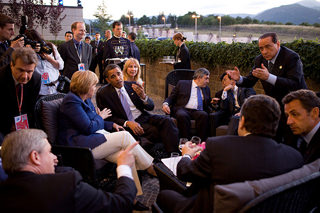The World Has Been Watching
Few Americans know, or much care, about the opinions foreigners hold of the United States This was displayed during the ignorant and solipsistic debate over when or whether the United States will pay its debts.
Few Americans know, or much care, about the opinions foreigners hold of the United States. This was displayed during the ignorant and solipsistic debate over when or whether the United States will pay its debts, which concluded Tuesday with a promise that it will soon be renewed. The debate was conducted as if foreign lenders had no role in the affair, and as if “the full faith and credit” of the United States were not a guarantee freely offered to those who in the past chose to purchase American bonds and other obligations.
The belief held by members of the House of Representatives and the Senate that the U.S. is the greatest country in history is good enough for them, and in their view ought to be good enough for everyone else. They take for granted American invulnerability and domination of the international scene — ephemeral as those qualities have recently proven to be in American economic performance, as well as by American military failures in Afghanistan and Iraq, its tortured present relationship with Pakistan, and the uncertainties presented and conflicts provoked by the Libyan intervention and the Arab awakening.
The general outlook of ordinary Americans, even (or especially) when they are elected to Congress, is to ignore the interests of the rest of the world and any threat from abroad, such as the threat of foreigners stopping purchase of U.S. bonds, after collapsing confidence in the U.S. — or when the threat knocks down skyscrapers in New York and attacks the Pentagon. The test of honor in the halls of Congress is whether one does or does not still affirm “American exceptionalism,” which is to say that the nation is better than any other in every respect.
There is an important issue that was not included in the deficit debate in Congress. It concerns exactly the present dysfunctions and long-term validity of the American economy, and in that respect, the future of the “American way of life” in this dollar-based international economy that the United States has created and globalized, at the instigation and with the collaboration of Wall Street.
The primordial quality of capitalism is that it is fiducial. It rests on trust. It cannot function unless those participating in it conduct their affairs in good faith, including trust in the value of the money in which business is transacted and in which debts will be honored. The United States dollar ceased to be convertible into gold in 1934 by passage of the Gold Reserve Act of that year, and President Richard Nixon terminated its nominal gold valuation when Charles de Gaulle’s France insisted on exchanging France’s dollars.
Thus American money, like all other modern money (excluding Maria Theresa silver dollars, still in circulation in Arabia and Africa!) is fiat money, accepted as worth what the issuing government or bank says it is worth, although constantly revalued by the currency market in relation to other currencies and gold and silver, and actually worth whatever you can buy with a dollar at a given time and place.
This ought to be understood by every American who took a college course in economics, but events in Washington during the past few weeks indirectly cast doubt on whether America’s foreign obligations are in fact payable on demand. When Congress talks of allowing or provoking national default, or the rating agencies of downgrading American debt, it undermines the trust upon which the system rests.
Trust is not in oversupply today. The United States has largely ceased to be a democratic republic (which is to say, a republic whose officers are validly elected by the demos, or commonality, of the community), but has become a plutocracy dominated by moneyed interests.
This is the result of (1) elimination by President Reagan of the existing Federal Communications Commission requirement for equal access to the public media by candidates for office (a system in which a Fox News, as presently constituted, would have no place); (2) the 1976 Supreme Court decision declaring money spent on political campaigns as a constitutionally protected form of free speech; and (3) more recent Supreme Court decisions banning restrictions on campaign funding and declaring business corporations “persons” with full constitutional rights to unlimited “free speech.” It is difficult to see how these changes and their consequences for American constitutional government can be reversed. The foreign implication is that the United States is no longer the political society it has, since World War II, been understood to be. This undermines the world’s trust in American democracy, and the American economy.
Visit William Pfaff’s website for more on his latest book, “The Irony of Manifest Destiny: The Tragedy of America’s Foreign Policy” (Walker & Co., $25), at www.williampfaff.com.
© 2011 Tribune Media Services, Inc.
Your support matters…Independent journalism is under threat and overshadowed by heavily funded mainstream media.
You can help level the playing field. Become a member.
Your tax-deductible contribution keeps us digging beneath the headlines to give you thought-provoking, investigative reporting and analysis that unearths what's really happening- without compromise.
Give today to support our courageous, independent journalists.









You need to be a supporter to comment.
There are currently no responses to this article.
Be the first to respond.